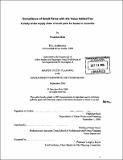Compliance of small firms with the value added tax : a study of the supply chain of small parts for buses in Columbia
Author(s)
Ruiz, Francisco (Ruiz Peronard)
DownloadFull printable version (4.569Mb)
Other Contributors
Massachusetts Institute of Technology. Dept. of Urban Studies and Planning.
Advisor
Diane Davis.
Terms of use
Metadata
Show full item recordAbstract
Governments are coming under increasing pressure to augment their revenues to offset the social costs of globalization and ever-widening trade and capital liberalization. Unarguably, the most sustainable way to procure additional resources is taxation. In this context, one of the main challenges for developing countries is how to bring the informal sector into the tax net. Influential institutions such as the World Bank and the IMF see the VAT as the solution. In Colombia, a weak social contract makes citizens perceive taxes as burdens with a marginal contribution to the common good. Consequently, evasion is widespread. This thesis attempts to understand why some small firms evade the VAT and others do not. It revolves around the supply chain for small parts for buses of the informal transportation systems of Colombian cities. This sector slowly evolves-under growing liberalization and top-down formalization of urban transportation-towards higher formality (all firms are now registered and firm owners hold legal titles of their property and machinery). They are informal in that they have varying degrees of compliance with State regulations (most notably tax and labor). Thus, most firms in this study fall somewhere on the continuum between informality and formality. (cont.) In the dynamic context of the sector studied, both external and internal factors determine a firm's decision to comply. External actors relevant to a firm's compliance with the VAT include the tax administration agency, clients and suppliers. Internal processes that influence a firm's decision to comply include moral principles (ethics) and customs of firm owners, management changes, and business upgrading. The main findings are: First, differing from the common argument that high costs of compliance keep firms informal, partial non-compliance is more expensive and complex than compliance in the sector studied. Second, contrary to what several authors assume, formality is a prerequisite and not a consequence of growth. Furthermore, partial non-compliance can keep small firms from growing. In that sense, policies aimed at promoting tax compliance among small firms in order to increase tax revenue can have positive effects on economic growth.
Description
Thesis (M.C.P.)--Massachusetts Institute of Technology, Dept. of Urban Studies and Planning, 2006. Includes bibliographical references (leaves 72-75).
Date issued
2006Department
Massachusetts Institute of Technology. Department of Urban Studies and PlanningPublisher
Massachusetts Institute of Technology
Keywords
Urban Studies and Planning.